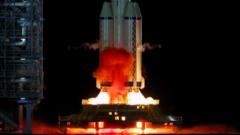In a moment of national pride, China's youngest-ever astronauts blasted off from the Gobi Desert, marking a significant milestone in the nation's expanding space ambitions. The launch from the Jiuquan Satellite launch center, observed by media and enthusiasts, symbolized a new era of exploration as three taikonauts embarked on a six-month mission aboard Shenzhou 19 to the Tiangong space station.
China’s space program has been underlined by President Xi Jinping’s declaration of harnessing the cosmos to transform the country into a dominant power in space. In contrast, U.S. officials express concerns, viewing the rapid advancements in China’s space capabilities—citing both civilian and military potential—as a direct challenge, especially as NASA's Bill Nelson points out the ideological and territorial race towards lunar exploration.
In the town of Dongfeng Space City, where patriotic fervor was palpable, locals adorned streets with national symbols, celebrating the taikonauts’ legacy. Featured prominently was pilot Cai Xuzhe, who expressed pride alongside younger crew members Wang Haoze and Song Lingdong. The crew’s encapsulated youthful spirit reflects aspirations harnessed from a lifetime inspired by China’s past space endeavors.
China’s recent successes, including a Mars rover landing and lunar sample collection, underscore its quest for technological advancement. Such achievements elevate the nation’s status in a high-stakes global context, challenging the United States’ traditional leadership in space exploration. While concerns linger about China’s intentions—particularly around the militarization of space—Chinese officials advocate for peaceful exploration and collaboration.
As both nations navigate the complexities of future space missions, the stakes extend beyond exploration to resource control on the Moon, where untapped mineral wealth offers tremendous economic potential. The narrative around the new space race has increasingly shifted focus, highlighting not just competition for exploration, but also who will capitalize on these celestial resources.
Despite the aspirations articulated by various officials, including the potential for international partnerships, the atmosphere around the launch remains cloaked in a veil of secrecy. The Chinese government emphasizes security as they unlock new technologies for scientific research, further amplifying concerns from Washington regarding the dual-use capabilities of their advancements.
Amid these strategies, there is a collective desire within China's space community to equip future generations with capabilities to sustain the nation’s aspirations in space. As they train the next batch of astronauts for potential lunar missions, experts emphasize that by unlocking the secrets of space, the benefits may serve as innovations that return to Earth.
With the glistening vastness of the cosmos as the ultimate frontier, the future of space exploration now hangs in the balance—where innovation and rivalry converge amid dreams of extraordinary possibilities. Whether this leads to international collaboration or further entrenchment of divide will remain a pivotal question in this new age of space exploration.



















